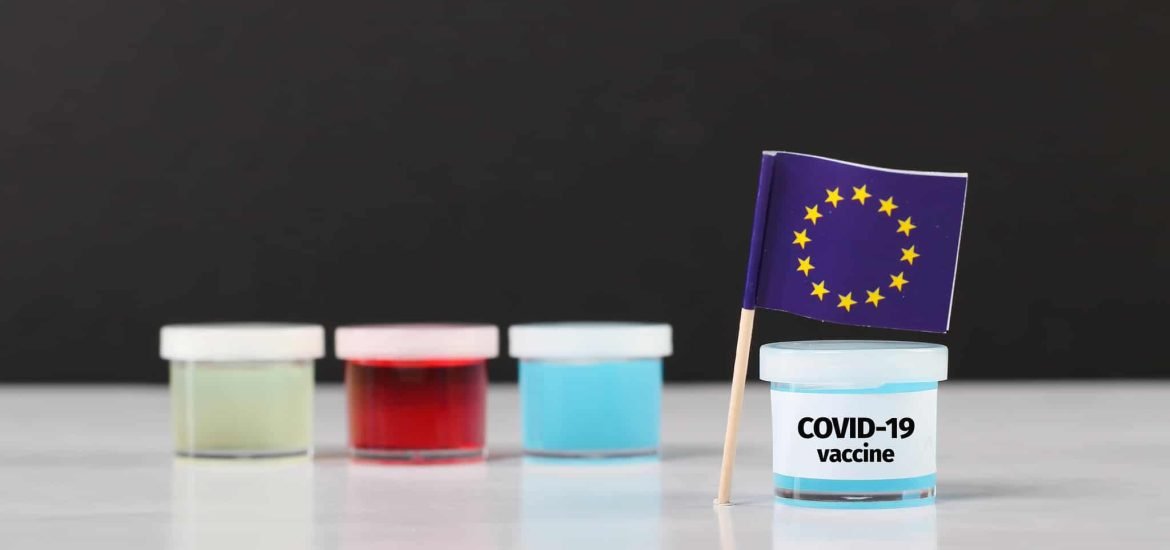
Swiss pharmaceutical giant Roche on Monday applied to market the firm’s first COVID-19 monoclonal antibody cocktail, Ronapreve (casirivimab/imdevimab), in the European Union. This is the final stage before Ronapreve, which Roche co-developed with US biotech firm Regeneron, can be released to frontline health workers across the continent. This latest development is an encouraging sign that the EU is putting its foot on the gas pedal when it comes to looking for and approving COVID-19 treatments, rather than merely relying on vaccines. This search for treatments is particularly vital given studies showing waning immunity from even the most effective vaccines and the fact that recent moves towards booster shot campaigns—the U.S., for example, just recommended a second dose of the J&J vaccine, whose big selling point had been that it was a single-dose jab—are complicating efforts to convince the still-unvaccinated to get their first dose.
After first grabbing headlines in October 2020 when it was used to treat then-President Donald Trump for the virus, Ronapreve is now licensed for emergency use in more than 20 countries, including the US, Japan and India. It received approval from British health authorities in August. The treatment from Roche contains two monoclonal antibodies, or mAbs: casirivimab and imdevimab. Produced in a laboratory, these molecules are designed to prevent the coronavirus attaching to the ACE2 receptor found on the surface of human cells in the respiratory tract. The treatment thereby boosts a patient’s immunity by giving the body the chance to clear the virus and begin recovery.
According to one study, the Ronapreve treatment reduced deaths in patients who had not yet mounted their own antibody response by a fifth, while another trial of high-risk patients saw hospitalization or death cut by 70%. At the same time, a study of individuals throughout the US, Romania and Moldova found that patients treated with Ronapreve were more than 80% less likely to catch COVID-19 from a household contact.
The only authorized treatment for COVID-19 in the EU thus far is antiviral medicine remdesivir, marketed as Veklury. The drug is currently used in adults and young people with pneumonia requiring supplemental oxygen, and helps curb the production of viral genetic material. However, according to the World Health Organisation (WHO), the drug has been found to have little to no effect on hospitalized COVID-19 patients, meaning that other drugs are sorely needed to help those patients with severe forms of the disease.
Fortunately, there are a number of promising options in clinical trials. Last month, the journal Clinical Infectious Diseases published promising Phase II results for fostamatinib, a drug produced by California’s Rigel Pharmaceuticals and marketed as Tavalisse in the United States and Tavlesse in Europe.
Fostamatinib is an oral spleen tyrosine kinase (SYK) inhibitor, already approved by medical regulators and used for the treatment of adult patients with chronic immune thrombocytopenia (ITP). A rare autoimmune disorder, ITP causes patients’ immune systems to destroy the body’s blood platelets, preventing the blood clotting that is necessary for healing. With inflammatory complications a substantial factor in deaths from COVID-19, Tavalisse presents doctors with a promising weapon in the fight against the disease.
The results of the double-blind, randomized Phase II trial assessing fostamatinib’s effect on hospitalised Covid patients were highly encouraging, with patients treated with fostamatinib spending on median four days less in the ICU and eight days less on oxygen. Tavalisse is now being evaluated in multiple Phase III trials, including the NIH’s Activ-4 trial and one supported by the U.S. Department of Defense, which will yield valuable data on fostamatinib’s potential as a Covid treatment.
At the same time, American drug maker Merck has developed its own antiviral pill, molnupiravir, in cooperation with Ridgeback Biotherapeutics. It’s the first oral anti-Covid drug that has delivered encouraging results and with demand expected to quickly outstrip supply, Merck has already agreed licensing deals with generic manufacturers to be able to provide poorer countries with the drug as well. The US has already secured 1.7 million courses of molnupiravir in advance, and the drug is now under consideration for emergency use authorisation after trials saw the drug cut the risk of hospitalisation by half.
Brussels is also considering striking a deal with Merck as well, but only once the drug has entered the EU approval stage. Yet this is where the problem starts, because EMA’s typically sluggish approval process and patchy regulatory framework could lead to approval delays and cause bottlenecks at this crucial time. Case in point is the fact that the UK approved its first vaccine on 2 December 2020, while the EU’s first approval came almost a month later amid widespread frustration from European health authorities. The EMA is responsible for approving all new drugs and vaccines across all EU member states, Iceland, Liechtenstein and Norway. Under EMA regulations, a vaccine must be approved by representatives of every member state and the European Commission before it can be circulated in the bloc. The approval process for potential COVID-19 treatments is similarly unwieldy.
The stakes are extraordinarily high given the breakthrough infections and hospitalization rates on the rise again: In France, the number of hospitalized hovers around 10,000, while Romania and Bulgaria are battling their highest case numbers since the start of the pandemic, to the extent that Bucharest had to suspend surgeries and asked Brussels to activate the EU Civil Protection Mechanism. With some three-quarters of Europe’s adult population now vaccinated, EU regulators should set their sights on fast-tracking an arsenal of COVID-19 treatments for use across the bloc. Only then can the seemingly never-ending pandemic waves be broken for good.
Image credit: Marco Verch Professional Photographer/Flickr